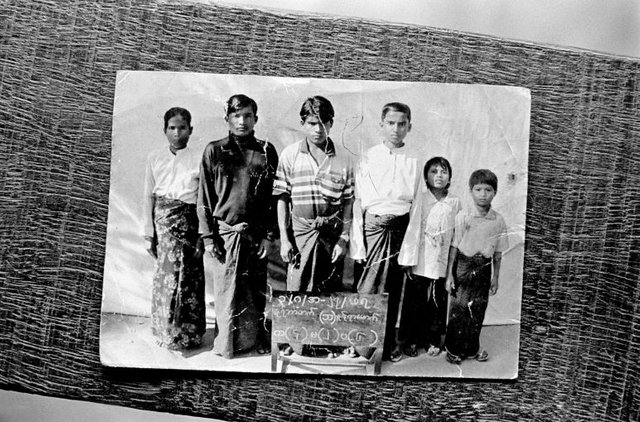
INTRODUCTION
In this modern era, while citizens of the world are travelling freely, using digital passports and electronic visas, my forgotten people are wandering around the globe by boat and on foot. Their very existence is being denied as they have no nationality, no passports, and no papers. Wherever they, go they end up in jails, some in camps and detention. Children are being separated from parents, husbands are separated from their wives, and those lost somewhere in the world will never have a chance to see their families again. It’s like the Rohingyas doesn’t have a place to call home in this universe. They are wandering aimlessly in search of a safe and welcoming place, and the hope to find that place, which is still uncertain. Hence, their fate as “Wanderers of the World” seems destined to be a never-ending story.
A BRIEF OVERVIEW OF ROHINGYA AND ARAKAN HISTORY
In the beginning, there was a green land located between Bangladesh and Myanmar. The land was named “Arakan” (meaning: the land of peace) by Arab traders; it had its own kingdom and it was contemporaneous to the MUGHAL dynasty. Even though the Mughals were there at the time, the Arakan people also had their kings such as “The King Sultans”. The land was inhabited by an indigenous people called “Rohingya” who in earlier days were issued from different tribes such as Indo-Arian people and some were descendants of Arabs. By the eighteen centuries, the majority of them had converted to Islam as they were neighboring the Mughals, although some did not. Those who did not convert to Islam described themselves as Buddhists and Hindus, while those who did convert are called Rohingya. To be very simplistic, for the purpose of our modern knowledge, I can say “the Rohingyas are the Muslim converts of the Arakan ethnicity”, which also mean that Arakan and Rohingya are the one and same blood, with the same language and the same civilization: the only difference is religion. The country was ruled by Muslim and Bhuddhist kings.
Looking back to my ancestral history, my spoken words are the same as ancient ‘Waithali’ (vesali) words and my culture was based on ‘Ananda Sandra Stone Monument.’ When Islam reached Arakan before 788 AD, it advanced the civilization in my land, in which we had lived with Buddhist and Hindu side by side for centuries with amity and concord as one big family and ruled the country together. We would issue coins and medallions bearing “Kalima” (the profession of faith in Islam) in Arabic and Persian script; Persian was our court language as it was said to have been common for the kings to adopt Muslim names.
My people are as proud of their history, culture and tradition as any other indigenous race of Burma and there is no justification to take them as a foreign race just because they profess Islam and keep their Islamic name. Other nationals can easily distinguish our identity from our features. My people are also different from one another in their language, customs and culture.
Therefore, we are much more than a national minority. In fact, we are a nation with a population of 3.5 million (both at home and abroad), having a well-documented history, separate culture, civilization, language and literature. Because we have a historically settled territory and a reasonable size of population and area, we consider ourselves as being distinct from other sectors of the Burmese society. We have been determined not only to preserve and develop our ancestral history and our ethnic identity, but also to transmit to future generations as the basis of our continued existence as a people, in accordance with our own cultural pattern, social institution and legal system.
Today, this very same civilized Rohingya people having a deep-rooted history of their origin, have become “described as illegal immigrants and refugees” in their own homeland and in other countries. They are also subjected to a systematic genocide by the Burmese government, while living under constant persecution and oppression in their day to day lives for generation after generation.
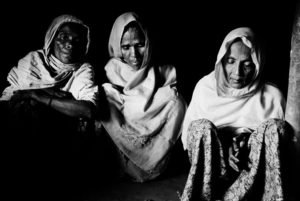
These women claim beatings, extortion and the seizure of their homes forced 120 families to flee their village in Myanmar in early 2009. Image: Greg Constantine.
MYANMAR’S RACIST STRAND OF BUDDHISM
Arakanese, which is called Rakhine in modern times, is one of the eight ethnicities that have been officially recognized in Burma, and its government has claimed these are originally from this land. Since Rakhine is derived from Arakan (Arakanese people = Rohingya), it is ironic and clear that Rohingya is one of the indigenous ethnicities of Myanmar as mentioned above. However, because the Rohingyas converted to Islam, the government has declared they are not a part the country.
The government has claimed that “the Rohingyas are not pure Arakanese; they are the children of Muslims who came from India and Bangladesh, and are intermarried, interracial couples due to their marriage ties. Therefore, they are not ethnically pure.” This claim is fundamentally racist statement: just like the Nazis of Germany; the Aryan supremacy and the white supremacy, which has led people to this logical conclusion about pure blood: what is pure blood?
The Burmese government and the majority of the people say that the Rohingyas are not pure Arakanese. Firstly, and historically, this claim is inaccurate. Secondly, there is no such thing as pure blood, whether Arab, white or black. Modern technology such as DNA testing has demonstrated that blood does not tell people apart in that sense. From a historical perspective, this claim is also untrue because it has been well established that the Arakan people actually converted to Islam during the time of the Mughals, and there were no nation states at the time. The borders of India, Pakistan, Bangladesh and Burma were created in 1948, in modern times. It is inaccurate and disingenuous to discuss the movements of the Rohingyas before these borders were created, because the story of people’s movements across the globe is generally hazy and complex.
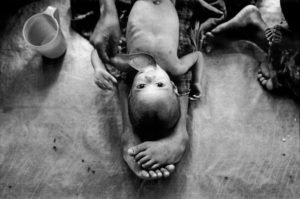
Rohingya Refugee who were forced to travel to Bangladesh in January 1992. Image: John Vink
THE ROHINGYA PERSECUTION AND DIASPORA
For the Rohingyas, despite the fact that their language is the language of Arakan, that their civilization is a civilization of Arakan people, they have nowhere to go. To make matters worse, the Burmese government has developed a systematic policy of persecuting them, from the very beginning of the creation of the state of Burma. From the early1940s, the Rohingyas have not been given right to own property, equal right to education, etc. In fact, studies were carried out in the 1980s, before modern persecution began, and a list of apartheid countries was compiled, comprising South Africa, which then was number one as you know. Burma was on that list and the treatment of the Rohingya was classified as apartheid.
The Rohingya, the largest Muslim group of Burma, were not allowed to access education; they were denied jobs, unlike the Buddhist majority; they were living in ghettos and dispersed in many separate locations. Consequently, the predictable outcomes began to materialize: poverty, high rates of crime, petty theft. When people have to feed their families, they have to do something. All of this fueled the perception that the Rohingyas are all bad people, criminals or terrorists.
What happened in the 1980s, and even before, is that this maltreatment of the Rohingyas led to a mass migration, a real Diaspora, of the Rohingyas around the world. They started to flee because they didn’t want to live in this land, because of the government’s racist treatment, and most importantly, they became stateless refugees because the Burmese government refused to give them passports. The reason for the Burmese government’s refusal to issue passports to the Rohingya was to deny acknowledging that they are equal to any other Burmese and are a part of Myanmar land. Had they obtained passports, they could have legitimately argued, ‘we are Burmese; how can you mistreat us?’
There is an infinite catch-22: the Burmese people want the Rohingyas to leave, but they don’t want to give them a passport. Therefore, they have to flee by boat or via some UN program that might allow you to travel without a passport. This is a major reason why, to this day, travel is so difficult for the Rohingyas. The alternative is that the Burmese want to kill out all Rohingyas, just as Hitler wanted the Final Solution for the Jews during World War 2.
The Rohingyas now became a stateless nation; the United States nation officially referred to Rohingya as a stateless ethnicity. The Rohingya do not have a state, and no state is willing to adopt them. Their own homeland, where they have lived for five hundred years or more, does not give them a passport, and they can do nothing to address this situation. Rohingya people fled, by tens of thousands; there are pockets of Rohingyas across the middle-east, in Asia and in western countries.
Will the world stand by and do nothing?
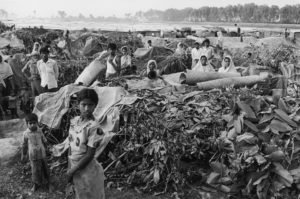
The scene at Dumdumia Camp, in Cox’s Bazar, Bangladesh, shows the lack of adequate shelter in January 1992. Image: Liba Taylor
RECOMMENDATIONS
In order to bring an end to the Rohingyas’ statelessness and sufferings, we must first of all understand that the massive changes might require some more time. The first step towards a new beginning will take at least a generation. We need to plan for the long term, indeed a generational change, which is unlikely to be realizable in the immediate. Another crucial fact to take into consideration is that the situation has become very complex and will require time and effort to readjust.
However, even if a long-term solution cannot be brought about right now, there must an immediate end to the killing and the persecution of the Rohingyas. Such a solution can only solution arise with the determined action from the international community, pressuring Myanmar to stop and desist their barbaric treatment of the Rohingyas who are, after all, living in their own country.
It has become obvious to me, as a Rohingya that our first and foremost mistake has been to leave our land and become dependent on other countries and the international community in general. What I would like to say is that, we were wrong to trust others, who never let any single chance go for benefiting from our vulnerabilities. However weak, we should have tried to solve our problems ourselves.
I am inclined to say that, today, we no longer have our land, not because of Myanmar, but because ourselves. We were naïve to believe that the international community would bring to end to our suffering. Obviously, there is no such thing as international community, there are only international interests, which means that countries claiming to have a solution to Rohingya situation have a selfish interest to use their influence, as they see potential benefits. There is no denying fact that a country will not seek to influence another country unless there is some self-interest. This may seem a harsh judgment on the international community. However, my claim is supported by the fact that, although the community has been working for many years to find a solution to the Rohingya solution, as yet they have done nothing. Rather than change, we have seen the situation for the Rohingyas getting even worse because of the other countries’ particular interests.
In order to begin the generational change mentioned above, we still need help from other countries, and this must come from the countries where the Rohingyas are now living in. Because my people have been persecuted since the beginning, they have lacked access to quality education. To remedy this situation, we the Rohingyas need friendly countries to help us grow educationally; first among these will be the countries to which we have fled and where we are presently residing. It is also essential that the international community use the diplomatic channels to ensure that the Rohingyas are issued with travel documents; these are essential for them to apply for the scholarships offered by prestigious university around world. As Rohingyas, we are prepared to rely on ourselves, we can solve many of our problem ourselves. Rather than simply worrying about us, with small or no results, people in the international community could help us meaningfully by letting us study in overseas schools and universities.
To address this humanitarian crisis, the Rohingya issue needs a permanent solution and not incremental fixes. A permanent solution must entail: firstly, full citizenship status and rights in Myanmar. The 1982 Citizenship Act must be repealed. Secondly, the Myanmar government must take back all the Rohingyas who have fled to different parts of Asia as a result of the military operations against them in their country. Thirdly, a safe zone must be designated for the Rohingyas in Myanmar, where they can live safely after their return.
Fourthly, the process of further ‘Burmanisation’ of Myanmar has to be stopped. There must be respect for diversity of ethnicity, religious freedom and integrate a multicultural society within the country. Finally, whilst I recognize that the global community has come forward to provide humanitarian assistance to the Rohingyas, I want all the countries to condemn the Myanmar government’s actions against the Rohingya minority and demand an end to these hostilities.
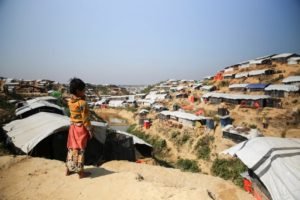
Rohingya refugee at Kutupalong camp arrived in October 2017. Image: MSF/National Geographic Magazine
By Jonaid
Jonaid is Rohingya student of political Science, based in Indonesian and he can be reached at : [email protected]
Posted from my blog with SteemPress : http://www.rvisiontv.com/rohingya-statelessness-has-a-solution/